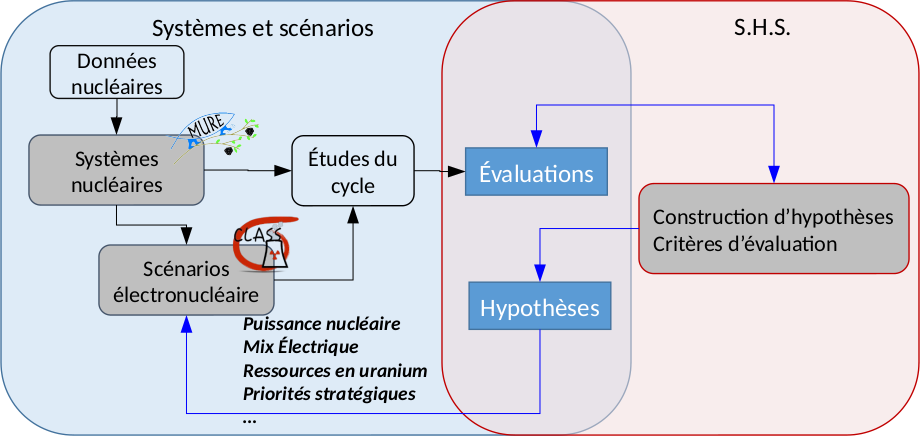Description of research activities
Inversted personnels : Sylvain DAVID, Xavier DOLIGEZ, Marc ERNOULT, Jiali LIANG
Contact : Marc ERNOULT
The simulation of innovative nuclear systems and electro-nuclear scenarios has two complementary objectives: to improve the modeling of fuel evolution in reactors and to explore the possibilities of recycling materials in the future. These studies allow to improve the predictibility of reactor simulations but also to feed the public reflection on the nuclear sector which implies important time and investments. In our team, this research is integrated in the development of two dedicated codes SMURE (for reactor studies) and CLASS (for cycle studies).
Thanks to these two codes, our work studies the management of plutonium (which must be seen, at the same time, as a precious resource and the major nuclear waste) and its use in current reactors (PWR). The scale of study can be that of the fuel assembly, that of the reactor core, or that of the entire fleet.
This multi-scale vision allows a very original analysis of different possible strategies for the evolution of nuclear power by the end of the century. This originality is reinforced on the one hand by the construction of innovative analysis methods, taking advantage of IN2P3’s powerful scientific computing infrastructures, and on the other hand by an interdisciplinary reflection in collaboration with sociologists on the role and uses of scenarios.
Particular attention is paid to the management of errors and their impact on our conclusions. This involves propagating the uncertainties of the physical data (cross sections, fission yields, etc.), quantifying the biases of the calculations and estimating the impact of the uncertainties of the cycle parameters.
Collaborations
Subatech-Nantes, LPSC-Grenoble, CEA/DES/IRESNE/DER/SPRC-Cadarache, IRSN-Fontenay aux Roses, École polytechnique de Montréal/Institut de Génie Nucléaire
Recent publication
-
2021 Coupled CLASS and DONJON5 3D full-core calculations and comparison with the neural network approach for fuel cycles involving MOX fueled PWRs. Guillet, M; Doligez, X; Marleau, G; Paradis, M; Ernoult, M; Thiollière, N; in Annals of Nuclear Energy
-
2021 Assessment of strategy robustness under disruption of objective in dynamic fuel cycle studies. Liang, J; Ernoult, M; Doligez, X; David, S; Bouneau, S; Thiollière, N; Krivtchik, Guillaume; Courtin, F; Zhou, Weifeng; Tillement, S; in Annals of Nuclear Energy
-
2021 Automated selection of nuclides and reactions of interest in a depletion simulation. Precision loss estimation for multiple outputs. Ernoult, M; Liang, J; Doligez, X; Thiollière, N; Meplan, Olivier; Bouneau, S; David, S; in Progress in Nuclear Energy
-
2019 Global and flexible models for Sodium-cooled Fast Reactors in fuel cycle simulations. Ernoult, M; Doligez, X; Thiollière, N; Zakari-Issoufou, AA; Bidaud, A; Bouneau, S; Clavel, JB; Courtin, F; David, S; Somaini, A; in Annals of Nuclear Energy
-
2018 A methodology for performing sensitivity analysis in dynamic fuel cycle simulation studies applied to a PWR fleet simulated with the CLASS tool. Thiollière, N; Clavel, J-B; Courtin, F; Doligez, X; Ernoult, M; Zakari-Issoufou, A-A; Krivtchik, G; Leniau, B; Mouginot, B; Bidaud, A; in EPJ Nuclear Science and Technology
-
2017 Fundamentals of reactor physics with a view to the (possible) futures of nuclear energy. Doligez, X; Bouneau, S; David, S; Ernoult, M; Zakari-Issoufou, Al-A; Thiollière, N; Bidaud, A; Méplan, O; Nuttin, A; Capellan, N; in Comptes Rendus Physique
-
2015 A neural network approach for burn-up calculation and its application to the dynamic fuel cycle code CLASS. Leniau, B; Mouginot, B; Thiolliere, N; Doligez, X; Bidaud, A; Courtin, F; Ernoult, M; David, S; in Annals of Nuclear Energy
Recently defended PhD
-
Léa TILLARD (defense in 2019) Impact du déploiement de réacteurs de type ASTRID sur la gestion dynamique du plutonium dans des scénarios de transitions électronucléaires
-
Alice SOMAINI (defense in 2017) Analyse des erreurs induites par une modélisation simplifiée sur l’évolution des combustibles REP Impact des fuites neutroniques dans les calculs cellules
Ongoing PhD
- Jiali LIANG (since 2018) : Robustesse des scénarios electro-nucléaires : Évaluer la capacité des stratégies de déploiement de réacteurs à neutrons rapides à s’adapter à des changements d’objectifs






